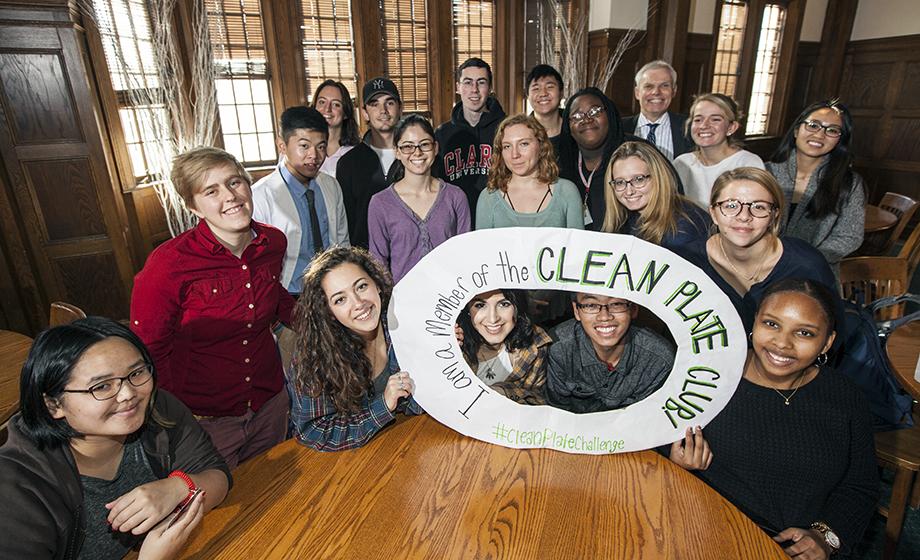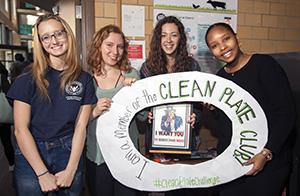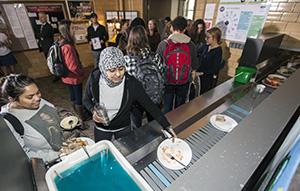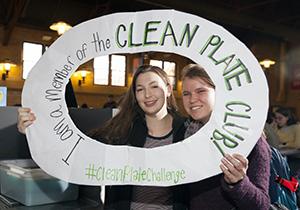Palates, plates and the president

Over the sound of forks scraping dishes and friendly conversation on a cool November Monday, cheers arose when a student who had just finished dining in Clark University’s Higgins Café put an empty plate on the dish belt.

On this day, the ordinary task was made less so by President David Angel’s First-Year Intensive class, who gathered at the exit to reward the student for taking part in the Clean Plate Challenge, their collaborative social-action exercise. One class member placed a large cardboard circle decorated to look like the outer edge of a plate around the student’s face as another class member snapped a photo and handed him a sticker.
As the student proudly displayed his sticker, class member Hannah Brier ’20, who headed up social media efforts for this campaign, said, “It’s important for a class to take action.”
While many first-year students hear Clark University’s motto “Challenge Convention. Change our World,” 18 get to spend the first semester at the University learning how live it with President Angel as their instructor. Each fall for the last three years, students in the course have analyzed how and why it’s important to practice and lead societal change, lessons that are honed through discussions, written assignments, by listening to guest speakers and taking part in capacity-building exercises, like the Clean Plate Challenge.
“In engaging in the Clean Plate Challenge, students are challenged to reflect on what Clark’s motto means for each of us and what is entailed in effecting positive change,” President Angel said. “The very modest one-hour activity triggered reflection on the part of the class that would not have happened if we had stayed in the classroom and only discussed change in the abstract.”
A part of Clark’s LEEP curriculum, First-Year Intensives give students an introduction to college studies and analysis in a variety of areas. Intimate in class size, some FYIs are related to students’ intended majors while others, like President Angel’s, are more interdisciplinary.
“As an FYI, the goals for this class are above all to support a successful transition and ‘fast start’ to Clark University — so that students are able to take maximum advantage of all the opportunities Clark offers,” he said.
For this exercise, Rose Wine ’20, who’s interested in pursuing English and international development and social change as majors, said the students chose to focus on sustainable practices regarding consumption, like taking only manageable portions to reduce waste, rather than other issues about which they were passionate.
“It came down to what change we could make on campus in one day,” she said.
The students were grouped into teams: the social media promotion team, the information team who stood by ready to teach about sustainable practices, the reward team with cameras in hand and stickers at the ready, and the welcome team who were tasked with telling hungry students about the initiative and the reward for taking part.

For co-instructor Son Ca Lam, a geography doctoral candidate, working with the students this semester has been about “creating a space where their energy and talents could be brought forth and channeled in positive ways.”
The course draws students from a variety of academic disciplines, all interested in using their energy and talent inside and outside the classroom. For example, Matt Pacenka ’20, who’s interested in physics, helped design the sticker rewards along with Eva Rosenzweig ’20. He said he appreciated the opportunity to do something creative.
“The collective action was entirely their idea,” Lam said. “President Angel and I gave them examples of some actions they could take around food waste, but what they came up was far more creative and imaginative than our suggestions.” She said the students made a poster that read “I want you to think sustainably” with a picture of President Angel’s face on Uncle Sam’s body to advertise the event.
During the collective action, Wine and Kyle Pecsok ’20, who’s interested in pursuing a major in geography, spoke about how the class has allowed them to think differently.
“Whatever job I get in the future, I’ll ask how it can help me find creative ways to help people,” Pecsok said.
“This class makes me think I can make a difference,” Wine added.
At the conclusion of the exercise during a discussion facilitated by President Angel and Lam, the energized students reflected on what they learned, what was done well and what could be improved.
Many of the students cited logistical ways to enhance the experience, like being more specific about the goals of change strategies. Others, like Maxx Levin ’20, drew the group’s attention to the project’s successes. President Angel agreed with Levin’s assessment saying he “put this in the win column.”

The course’s experiential learning component continues through to the end of the semester. After listening to representatives from on-campus social change organizations, like All Kinds of Girls, the Local Root farm stand and NARAL, the students identify an issue they care about, present TED-style talks and propose solutions in final papers.
Each course component builds on key takeaways, which President Angel identifies as “recognizing ‘micro-practices’ associated with student success, such as building connections with faculty and professional staff; strengthening key capabilities, such as writing and giving presentations; and perhaps most importantly, an invitation to students to self-author their education in ways that center what they study on the issues and questions they care about.”
It’s this introduction to experiential learning he hopes will inform the students’ Clark years and begin forming a foundation for contributions to their own communities after graduation.
“It’s important for the students to have as many experiences as they can to take education outside the classroom.”


